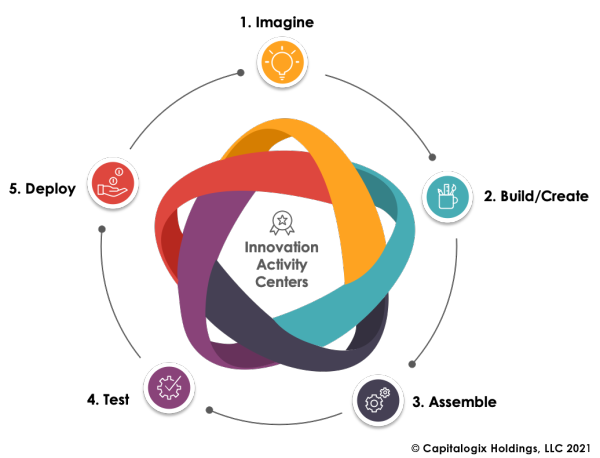I recently did two interviews I want to share with you. The first was done with Dan Sullivan and Steven Krein for Strategic Coach's Free Zone Frontier podcast... and the second was with Brett Kaufman on his Gravity podcast.
Please listen to them. They were quite different, but both were well done and interesting.
Free Zone Frontier with Dan Sullivan and Steve Krein
Free Zone Frontier is a Strategic Coach group (and podcast) about creating "Free Zones." It refers to the green space where entrepreneurs can collaborate and create without competition.
It's a transformative idea for entrepreneurial growth.
In my episode, we focused on topics like building your own future, how decision-making frameworks and technology can extend your edge, and what it takes to get to the next level. I realize there is a lot of Strategic Coach jargon in this episode, but it is still easy to understand, and there was great energy and an elevated conversation about worthy topics.
As an aside, Steve Krein happens to be my cousin, and we joined Strategic Coach entirely separately before realizing we had joined the same group.
The podcast is 47 Minutes. I hope you enjoy it.
Or click here to listen on: Spotify, Google Podcasts, Apple Podcasts
Gravity Podcast with Brett Kaufman
Normally, I talk about business, mental models, and the future of AI and technology, but Brett Kaufman brought something different out of me.
Brett's Gravity Project is about living with intention, community, consciousness, and connection. He focuses on getting people to share their life experiences ... with the intent that others can see themselves in your story.
In my talk with Brett, we do talk about the entrepreneurial journey ... but we also probe some deep insights by discussing the death of my younger brother, how my life changed almost immediately upon meeting my wife, and why love is the most powerful and base energy in the universe.
This was not a typical conversation for me (a different ratio of head-to-heart), but it was a good one (and I've had a lot of people reach out because of this podcast).
The episode is 65 minutes. I hope you enjoy it.
Click here to listen on: Spotify, Apple Podcasts, Listen Notes
Let me know what you think.
Getting To Next: How Thoughts Become Things
Two weeks ago, I introduced Innovation Activity Centers which are the building blocks for my technology adoption model.
Today, I have a video and a worksheet for you that goes into the overarching Technology Adoption Model Framework. It explains how thoughts become things and how ideas scale with respect to capability, audience, and monetization.
The four base stages of this framework are: Capability –> Prototype –> Product –> Platform.
It's a great use of 20 minutes. Check it out.
While the Technology Adoption Model Framework stages are important, the ultimate takeaway is that you don't have to predict what's coming, only how human nature works in response to the capabilities in front of them.
It's a bit cliche, but to paraphrase Wayne Gretzky, you just have to skate to where you think the puck is going to be.
Desire fuels commerce. As money fuels progress, desire grows ... and so does the money funding that path. As such, the path forward is relatively easy to imagine.
This isn't about predicting specific technologies, but rather about the capabilities people will want. I think of it as anticipating the natural path. It is easier to ride the wave than it is to fight nature.
Each stage is really about the opportunity to scale desire and adoption.
It isn't really about building the technology, rather it is about supporting the desire.
If you understand what is coming, you don't have to build it, but you can figure out where you want to build something that will benefit from it.
This model is fractal. It works on many levels of magnification or iteration.
What first looks like a product is later seen as a prototype for something bigger.
For example, as a Product transforms into a Platform, it becomes almost like an industry of its own. Consequently, it becomes the seed for a new set of Capabilities, Prototypes, and Products.
SpaceX's goal to get to Mars feels like their North Star right now ... but once it's achieved, it becomes the foundation for new goals.
This Framework helps you validate capabilities before sinking resources into them.
In the video, I walk you through several examples of companies, their innovations, and how they fit into each stage. I even used Capitalogix as an example.
I'm also attaching a fillable PDF of the form we used so that you can run through this with your business as well.
As I continue to refine and work with this framework, I look forward to improving it and sharing it with you all.
As the world continues to change faster and more dramatically, this framework will help you anticipate changes, and it will also help you take advantage of them.
If you have any questions or comments about the idea, or how to implement it, feel free to reach out.
Onwards!
Posted at 07:48 PM in Business, Current Affairs, Gadgets, Ideas, Market Commentary, Personal Development, Science, Trading, Trading Tools, Web/Tech | Permalink | Comments (0)
Reblog (0)